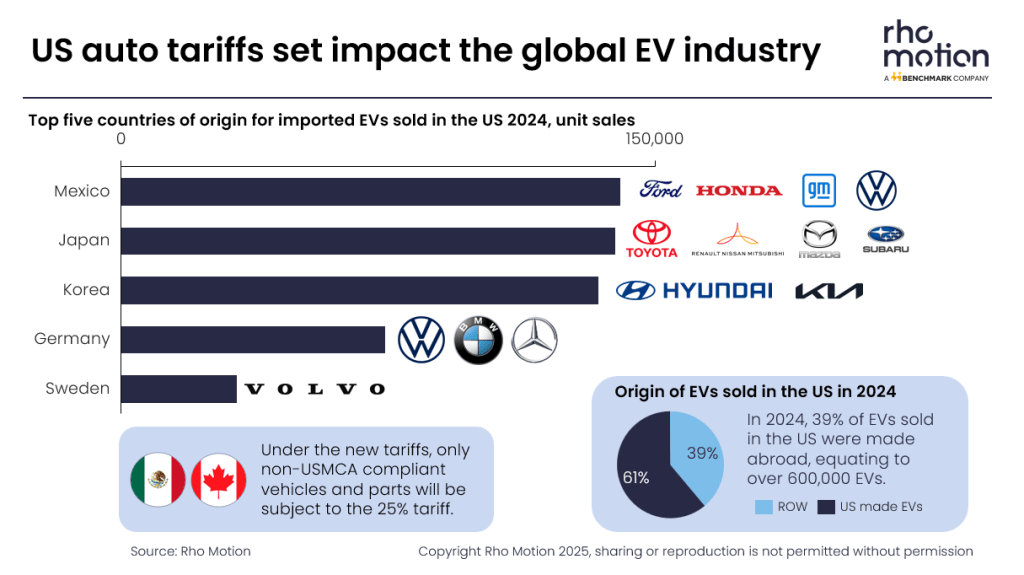The Trump Administration has announced additional tariffs on all automobiles and automotive parts imported into the US. For passenger vehicles this comes on top of the 2.5% tariff already in place. Considering the US imported almost 40% of the EVs sold in the country last year, this is set to have significant impact on the EV industry, as well as the broader automotive industry. The tariffs for automobiles are set to come into effect on the 3rd of April, while the tariffs for automotive parts will be implemented in or after May as the administration considers how they will work in practice.
Where does the US import its EVs from?

In 2024, Mexico was the country from which the largest number of EVs imported into the US, with Japan and Korea exporting a similar number of EVs the US, each country accounting for approximately 9% of the total US EV market in 2024. Within Europe Germany and Sweden had the largest export markets to the US, accounting for approximately 7% of the US’ EV market last year.
Have you read?
- India looks to aid domestic battery production for EVs and phones
- When will the EV market reach profitability?
- Which are the top 20 countries for battery energy storage capacity?
- What does BYD’s megawatt charging system mean for the charging industry?
Who is set to be affected the most?
When examining which vehicle OEMs export the most EVs to the US, three groups standout Hyundai, Toyota and BMW. While they all have production bases within the US the majority of their EV sales in the country are imports. Assuming these OEMs pass the cost of the tariffs onto consumers, the tariffs are likely to have a negative impact on sales.

Notably, on the 25th of March Hyundai announced it would invest USD21 billion into the US, USD9 billion of which would be to expand its production capabilities in the country.
The Mexico and Canada caveat
Mexico and Canada are already subject to their own tariffs with any non USMCA compliant goods subject to a 25% tariff. In 2024, just over 10% of all EVs sold in the US originated from either Canada or Mexico.
It is worth noting that to meet the USMCA compliance at least 75% of the vehicle value must come from North America. Under the new Trump tariff policy, the non-compliant parts of a USMCA compliant vehicle would still be subject to a 25% tariff. This administratively is expected to be very difficult to implement and is still anticipated to add further cost to consumers.
Key Read: Trump’s Mexico, Canada and China tariffs put risks on the EV and ESS industry
How does this effect the US EV market?
Will Roberts, Automotive Research Lead at Rho Motion noted “With GM and Ford making the majority of EVs in Mexico, they are well placed to qualify as USMCA compliant given their batteries are supplied from within the region and represent a high proportion of the vehicle’s value.”
He continued “Other key OEMs with high EV imports are currently progressing plans to build up US manufacturing capacity, Hyundai’s recent announcement seems particularly well timed. However, others such as BMW have made big plans for Mexican EV production which they may now reconsider. It could also slow the introduction of other new models from European manufacturing sites, hurting model availability and ultimately EV adoption in the US.”
More Information
For more information about tariffs and EV & Battery markets see our research or get in touch.
Image Credit: Adobe Stock

 Back to News
Back to News